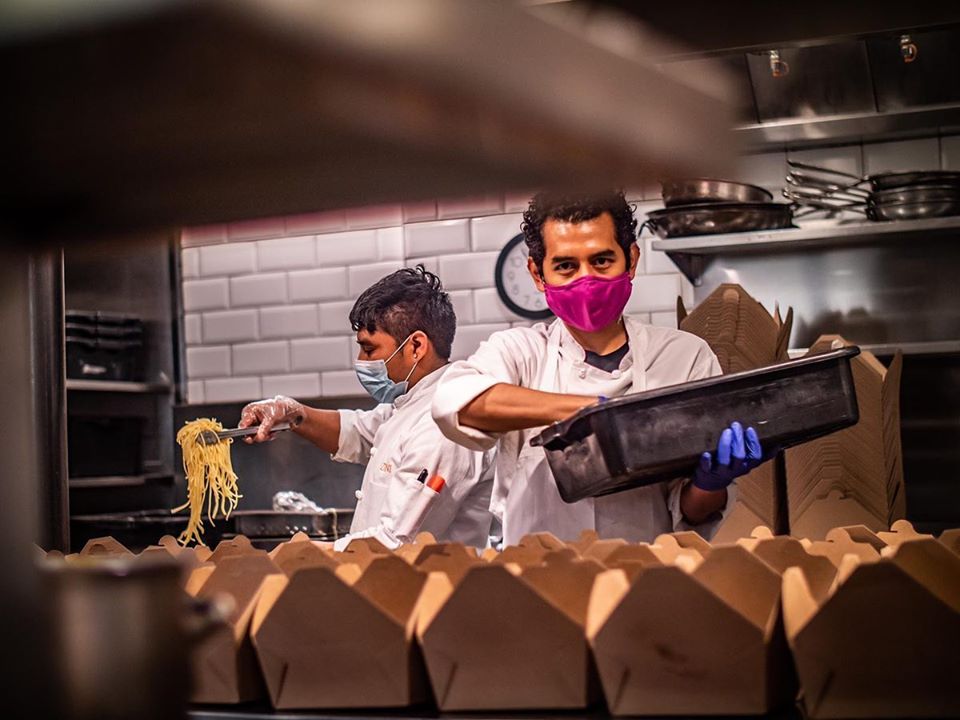About 80 seniors in Santa Clara and Sunnyvale are getting hot meals delivered from restaurants since May 22 thanks to California’s Great Plates Delivered program, the state program with a dual goal of helping residents and local restaurants been hard hit by the COVID-19 pandemic. Seventy-five percent of the program’s funding comes from FEMA.
“The program gets meals to people who wouldn’t otherwise have hot meals,” said City of San José’s Ed Bautista, Program Director.
The program contracts with local restaurants to deliver meals for people over 65 who aren’t served by other meal programs, and aims to serve 2,000 eligible residents, said Bautista.
So far seven Santa Clara County restaurants are participating: Bloom catering, Adelitas, Vegetarian House, Pedro’s, Faultline Brewery, Yolked, Pho Bang and Maylaya. To qualify, restaurants must be locally owned, utilize local food suppliers, be able to ramp up volume quickly, and not be participating in any other business or meal programs.
The program is run day-to-day by World Central Kitchen [WCK] (wck.org), which has an established program delivering meals — 20 million — since the pandemic began.
“We saw the impact [of COVID-19] on food and beverage businesses, so we started our restaurant program to utilize them for delivering meals,” said Jason Collis, WCK’s Director of Procurement. “Who better to do this than chefs?”
After screening applicants to ensure that they have the capability to deliver the meals, WCK organizes the meal delivery and reviews menus for nutrition and variety.
Participants don’t choose what restaurants they will get meals from, although the program accommodates special requirements. Restaurants rotate weekly in the County, so diners get to taste all of them.
Great Plates Supports Local Economies and Family Farms
Great Plates Delivered favors locally owned non-chain restaurants that use local food suppliers. The spectrum of restaurants runs the gamut from mom and pop neighborhood restaurants to nationally renowned eateries.
“Part of the selection consideration was for restaurant sustainability, supporting those businesses in a meaningful way,” explained San José’s Bautista. “We’re also looking at geographic location to best serve the area.”
The program has been a lifesaver for Adelita’s, which has been serving up Mexican home cooking in San Jose for more than 20 years. As part of the program, co-owner Patricia Morales has been expanding her menu to provide variety.
“It’s been a blessing,” says Morales. The restaurant is serving 80 to100 people weekly, with deliveries by DoorDash.
“The income helps us keep our people working,” she says. “Especially in the early morning because it doesn’t interfere with our busier times.”
San Francisco’s 40-year institution Zuni Cafe is also keeping employees working thanks to Great Plates.
One of the restaurant’s revenue streams was catering for tech campuses,” explained Chef Nate Norris. “When the offices closed we lost our income.” The restaurant currently serves meals every week to 150 San Francisco residents.
For Norris supporting the restaurant’s family farm suppliers is as important as keeping employees. “The program pays a reasonable fee, but we want to continue to work with our suppliers, so we don’t make any profit on this,” said Norris.
Adelita’s is likewise maintaining supplier relationships. “For over 20 years we’ve had the same produce supplier from Watsonville,” Morales said. “Our meat comes from family-owned businesses.”
De-centralized programs like Great Plates and WCK programs also increase national food security, said Zuni’s Norris.
The COVID-19 shutdown of corporate meat processing plants illustrates the risk, he explained. “Putting people back in harm’s way isn’t an acceptable answer. The right kinds of programs can help all the things we care about.
“In a vacuum of [federal] government action, local governments, businesses have been able to take action,” he continued. “This program [Great Plates] is possible in this moment, but government needs to take action so there’s equal access to healthy food. We’re doing this now because we believe it’s important.”
For WCK, the future is uncertain, said Collis, but restaurants will still need help. “It was already hard for restaurants to survive at 100 percent occupancy, let alone 50 percent.” The non-profit has pledged $50 million to aid local restaurants.
For more information about Great Plates Delivered and sign up, visit siliconvalleystrong.org/gpd/ or call 408-350-3230 (option 1).
To qualify you must: be 60 or older, at high medical risk, living alone or with one other person, not receiving meals from another state or federal program, earn no more than $75,000, and be unable to prepare meals at home. The program provides lunch and dinner five days a week.
For a complete list of food services in Santa Clara and Sunnyvale visit santaclaraca.gov and Sunnyvale.ca.gov.



